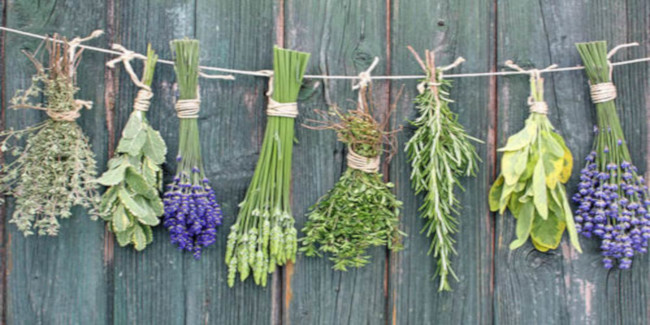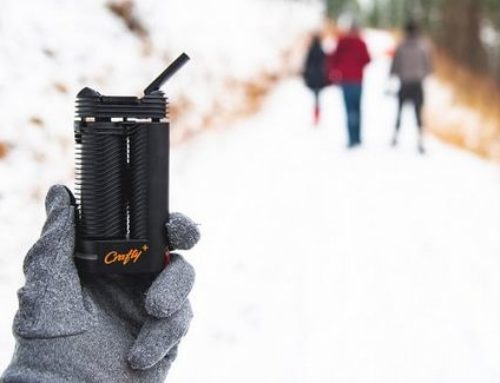Did you know that every plant that is sprayed has its own range of vaporization temperatures?
Indeed, aromatic or medicinal herbs contain a multitude of molecules or active ingredients that have their own sublimation temperature (transition from solid to gaseous).
We will therefore obtain different therapeutic results depending on the temperature used and therefore vaporized molecules!
That's why not all plants will be sprayed at the same vaporization temperature!
Here is our table with the vaporization temperatures of aromatic or medicinal plants and herbs with their description, their properties and warnings and/or against indications.
This table is there as an indication in the sense that it will often be necessary to adapt the vaporization temperature according to the vaporizer used …
It is always advisable to seek the advice of a qualified doctor or herbalist before spraying medicinal plants or herbs.
My plant is not on the list of vaporization temperatures !!!
If you don't know the vaporization temperature of a plant for your vaporizer, there is fortunately a technique!
A very good quality vaporizer is recommended!
Ideally a Volcano salon vaporizer or a Mighty as a portable vaporizer.
Start with a low temperature like 100oC by gradually raising the temperature of your vaporizer.
By the time the taste is the densest without being deformed, you will not be far from the ideal vaporization temperature for this plant !!!
| Plant names | Temperature panels | Properties |
|---|---|---|
| absinthe | 100C to 150C | Moved, deworming, stimulating, antiseptic. |
| Acorus calamus | 150C to 175C | ✳️ Seed effects: promotes the expulsion of gases, relieves muscle contractions, activates perspiration, stimulant, tonic.
Use: stimulant, aerophagia, fever, colic, aphrodisiac. ⚠️ not use without medical advice and never more than a month. 💡Remarque: some varieties contain asarone, which is thought to be carcinogenic. |
| motherwort | 100C to 150C | Hypotensor, Anesthetic. |
| Garlic | 175C to 200C | ✳️ Antioxidant, antiseptic (intestinal and pulmonary), digestive, expectorant, hypoglycemic, hypotensive, sweat, deworming.
Main effects: antibiotic, expectorant, activates sweating, hypotensive, reduces blood clots, hypoglycemic, deworming. Use: bronchial infection, cold, flu, ear infection, prevents circulatory disorders, lowers cholesterol, reduces blood sugar. |
| Bear garlic | 150C to 175C | Difficult digestion, slow digestion, bloating, flatulence, belated, intestinal spasms. |
| Aloe vera | 175C to 200C |
✳️ Se natural markets, fatigue. Main effects: anti-inflammatory, antiseptic, emmenagogue, healing. Use: laxative, high-dose purgative, ulcer, liver congestion. ⚠️ Warning: do not use for extended time. Not recommended for pregnancy or breastfeeding. 🚫Fortously not recommended for hemorrhoids or kidney disease. |
| angelic | 100C to 150C | Antispasmodic, Cholagogue, Calmante. |
| Anis | 150C to 175C | Difficult digestion, slow digestion, bloating, flatulence, belated, intestinal spasms. |
| mugwort | 100C to 150C | ✳️ Emmenagogue, sweat, bile duct, bitter tonic. Promotes dreams and protects against nightmares, opens appetite, epilepsy, parkinson's disease, infertility.
⚠️ Warning: 🚫 not recommended during pregnancy, accelerates the appearance of menstruation. |
| hawthorn | 125C to 175C | ✳️ Sectoral effects: cardiac tonic, vasodilator, relaxing, antioxidant.
Use: angina, moderate heart failure and heart rhythm disorder, blood pressure. ⚠️ Warning: always use under medical supervision because it is not an innocuous plant. 💡 Note: In combination with Ginkgo, hawthorn improves memory by stimulating brain irrigation. |
| Black Ballote | 100C to 125C | ✳️ Main effects: diaphortic, anti-vomitive, anti-spasmodic sedative.
Use: convulsion, menopausal disorder, nausea, vomiting, arthritis, gout. |
| Burdock (root) | 150C to 200C | ✳️ Seed effects: desterciative, light diuretic, antibiotic, antiseptic.
Use: arthritis, rheumatism, gout, lower cholesterol. ⚠️ Attention: not recommended in high doses during pregnancy. |
| Basil | 110C to 150C | Carminative, lactagogue, stomachic, antispasmodic, disinfectant. |
| Berberis (Epine vinette) | 175C to 200C | ✳️ Setal effects: cathartic, bile duct, diuretic, tonic, laxative.
Use: kidney disorder, urinary stones, stimulates gastric and liver activity, cholera, psoriasis. ⚠️ ☣️ Attention: the plant is very toxic, use it only under medical control, do not exceed 4 weeks of treatment. 🚫 not to use during pregnancy. |
| Coffee (seed) | 150C to 175C | ✳️ Secipal effects: stimulant.
Use: strengthens mental activity and muscle tone temporarily. ⚠️ Attention: People who have stomach problems and diarrhea, high blood pressure or palpitations should avoid coffee. 💡Remarque: stimulating at the moment, coffee helps to weaken the vital energy of the individual. |
| Calea zacatechichi (dream grass) | 185C to 200C | Boosts appetite and improves natural metabolism.
Allows lucid dreams. |
| Chamomile M (capitules) | 170C to 190C | ✳️ Stable effects: anti-inflammatory, antispasmodic, relaxing, promotes the expulsion of gases, slightly aperitif, anti-allergic.
Use: digestive problems, nervous tension, allergy (hay fever, asthma). |
| Chamomile R (capitules) | 170C to 190C | ✳️ Antidiapertic, antiviral, antibacterial, anti-inflammatory, relaxing, antispasmodic, calming.
💡Remarque: Roman chamomile (anthemis nobilis) has the same properties, Temperature, and even notes as for sage. |
| Hemp L. | 140C to 200C | ✳️ Spant effects: analgesic, sedative, anti-inflammatory, antiemetic, antispasmodic.
Use: herniated disc, sciatica, epilepsy, cancer, AIDS, multiple sclerosis and other muscle pathologies, brain hyperactivity, muscle spasms (spasmophilia), glaucoma, eye tension, lower blood pressure, asthma, menstrual pain, childbirth-related pain, arthritis, rheumatism, promotes sleep. 💡The seeds are used in China as a mild laxative. |
| Carum caraway | 150C to 175C | ✳️ Fathst effects: antispasmodic, expectorant, fortifying.
Use: bronchitis, cough, intestinal spasms and flatulence.💡Remark: caraway stimulates lactation. |
| black currant | 175C to 200C | Anti-diarrheal, healing, circulatory, anti-rheumatic. |
| Cataire (cat grass) | 100C to 150C | Low-intensity relaxer. |
| Thistle marries (Carduus marianus) | 125C to 175C | ✳️ Stial effects: protects the liver, stimulates bile secretion, stimulates lactation, antidepressant.
Use: depression, liver disorder, jaundice, liver disease, mitigates the effects of chemotherapy on the liver, alcohol abuse. 💡 Note: excellent plant for the liver. |
| Dog dactyl | 185C to 200C | |
| Chionanthus virginicus (Snow tree) | 175C to 200C | ✳️ Prial effects: tonic, bitter, aperitif, digestive.
Use: acts on the liver, bladder pain, gallstones, jaundice, chronic asthenia, liver disorder. 💡 Note: See Thistle Marries. |
| Lemongrass | 125C to 150C | Anti-inflammatory, sedative, improves digestion. |
| Consoude (large, officinal symphytum) | 150C to 175C | ✳️ Main effects: emollient, astringent, anti-inflammatory, heal wounds and accelerate the consolidation of fractures.
Use: bronchitis, pleurisy. ⚠️ Attention: not recommended for internal use (presence of pyrrolizidinic alkaloids)💡 Note: very good plant for external use. |
| poppy | 125C to 175C | ✳️ Seed effects: sedative, beatic, softening.
Use: hoarseness, irritating cough, insomnia, irritability, excessive nervousness.
|
| Turmeric | 175 to 200oC | ✳️ Main effects: stimulates bile secretion, anti-inflammatory, relieves stomach pain, antioxidant, antibacterial, anticoagulant.
Use: powerful anti-inflammatory, lowers cholesterol, protective action on the stomach and liver, arthritis, asthma, eczema, limits the risk of apoplexy and heart attack. |
| Damiana | 150C to 190C | ✳️ Main effects: tonic, stimulant, diuretic and slightly laxative, antidepressant, acts on testosterone, aphrodisiac.
Use: mild depression, nervous fatigue, sexual stimulant (for both sexes), gynecological disorders, urinary antiseptic. |
| Dioscorea villosa (Wild Igname) | 175C to 200C | ✳️ Main effects: antispasmodic, anti-inflammatory, anti-rhyming, promotes perspiration, diuretic.
Use: gynecological disorder, arthritis, rheumatism, cramps, muscle tension, colic, gallbladder inflammation.
|
| Eucalyptus globulus | 130oC | ✳️ Main effects: Antiseptic, expectorant, rubefiant.
Use: colds, flu, bronchitis, respiratory infections in general. |
| Equisetum arvense (Preèle) | 100C to 150C | ✳️ Main effects: antihophrethy, astringent, healing.
Use: calm cough, rheumatism and arthritis, internal bleeding, nosebleed, cystitis.
|
| Fennel (foeniculum vulgare) | 150C to 175C | ✳️ Main effects: diuretic, anti-inflammatory, expectorant.
Use: irritation of the throat, gallstones, bloating.
|
| clove | 125C to 150C | ✳️ Main effects: antiseptic, promotes the expulsion of gases, stimulating, relieving pain, preventing vomiting, antispasmodic, antiparasitic.
Use: malaria, cholera, tuberculosis, muscle spasm, cough, physical and physical stimulant, aphrodisiac.
|
| ginkgo | 150C to 175C | ✳️ Main effects: stimulates and tones circulation, antiasthmatic, antispasmodic, antiallergenic, anti-inflammatory.
Use: difficulty breathing, asthma, cerebral blood circulation.
Note: very good plant for memory. |
| ginseng | 175C to 200C | ✳️ Main effects: promotes resistance to stress, tonic.
Use: stress, overwork, male aphrodisiac, fortifying.
|
| ginger | 175C to 200C | ✳️ Main effects: antivomiti, promotes the expulsion of gases, stimulates circulation, calms cough, anti-inflammatory, antiseptic.
Use: nausea, poor transport, raises blood pressure, stimulates sweating, lowers fever.
|
| Gotu kola | 100C to 150C | Tonic, venous insufficiency, venous hypertension, microangiopathy, anxiety.
Improves memory and cognitive abilities. |
| Guarana (Paullinia cupana) | 125C to 175C | ✳️ Main effects: astringent, stimulating, diuretic.
Use: headache, mild depression, diarrhea, decreases fatigue in the short term.
💡 Note: contains caffeine and is used as a substitute for coffee. |
| Official Marshmallow | 150C to 200C | ✳️ Main effects: emollient, softening, anti-inflammatory, calming.
Use: inflammation and irritation of the lungs, bronchitis, dry cough, kidney stones, cystitis. |
| hops | 154oC | ✳️ Main effects: sedative, soporific, antispasmodic, bitter tonic.
Use: insomnia, nervousness, stress.
|
| Canadian Hydrast (root, rhizome) | 175C to 200C | ✳️ Main effects: bitter tonic, mild laxative, anti-inflammatory, antibacterial, uterine stimulant, stops internal bleeding, astringent.
Use: inflammation of the mucous membranes of the eye, ear, nose, throat, stomach, intestine and vagina, reduces menstrual flow, hemorrhage after childbirth.
🚫 Do not use in high blood pressure, pregnancy or breastfeeding. |
| Hyssop (somnites) | 100C to 150C | ✳️ Main effects: sedative, tonic, expectorant.
Use: lung infection, bronchitis, asthma.
|
| Kava-kava | 175C to 200C | ✳️ Main effects: stimulant, tonic, anxyolytic, urinary antiseptic, pain relief, sleeping pill.
Use: sedative, anxiety, aphrodisiac, relaxing, narcotic.
|
| Lavender | 100C to 125C | ✳️ Main effects: promotes the expulsion of gases, relieves muscle contractions, antidepressant, antiseptic, antibacterial, stimulates menstrual flow.
Use: insomnia, depression, headaches, digestion. |
| Pink Lotus | 100C to 125C | Soothing and euphoric. |
| Blue Lotus | 100C to 125C | Anti-spasmodic, euphoric, sexual stimulation. |
| Maca | 150C to 200C | Energy stimulating and aphrodisiac. |
| Marihuanilla | 150C to 175C | Relaxing, anti-tank. |
| marjoram | 100C to 150C | Antiseptic, calming, anti-stress, tonic, relaxing, warming. |
| Marshmallow | 150C to 200C | See marshmallow. |
| mallow | 125C to 150C | Oral disinfectant, soothing, emollient, disinfectant. |
| Melissa | 142oC | ✳️ Main effects: relaxing, antispasmodic, stimulates perspiration, promotes gas evacuation, antiviral, nervous tonic.
Use: anxiety, nervous headaches, mild depression. |
| peppermint | 100C to 150C | ✳️ Main effects: promotes the expulsion of gases, relaxes muscles, stimulates perspiration, stimulates bile secretion, antiseptic.
Use: bronchial infection, headaches related to poor digestion.
|
| spearmint | 100C to 150C | Tonic, fortifier, digestive, aromatic, antiflatulent, antispasmodic. |
| yarrow | 100C to 150C | Cicatrisant, tonic, peptic, antispasmodic, emmenagogue. |
| Millepertuis (St john Worth) | 100C to 150C | ✳️ Main effects: antidepressant, antispasmodic, stimulates bile secretion, astringent, sedative, relieves pain, healing.
Use: nervousness, menopausal disorder, liver and bile tonic, healing.
|
| Muira puama | 175C to 200C | Anti-fatigue, contains sterols and an alkaloid, promotes libido, aphrodisiacs. |
| Mulungu | 175C to 200C | Natural tranquilizer. |
| Blueberry | 175C to 200C | Antibacterial, antidiarrheal, astringent. |
| Nepeta cataria | 150oC | relaxing. |
| Kola nuts | 185C to 200C | ✳️ Main effects: digestive, tonic, aphrodisiac, diuretic, astringent
Use: stimulates the body, antidepressant, migraine, diarrhea, dysentery.
|
| Papaver somniferum (poppy) | 125C to 175C | See Poppy. |
| Passivelore | 100C to 150C | ✳️ Main effects: sedative, antispasmodic, tranquilizer.
Use: insomnia, anxiety, nervousness, headaches.
|
| Wild Thought | 100C to 150C | Anti-inflammatory, purifying, expectorant, diuretic. |
| Dandelion | 125C to 150C | For digestive and apétit disorders, improves liver, bile and urinary functions, helps prevent kidney stones and reduce water retention, constipation, hemorrhoids, difficult digestion, and rheumatism. |
| Portucala (Fore pisser) | 100C to 150C | Main effects: diuretic, invigorating.
Use: culinary. |
| liquorice | 175C to 200C | ✳️ Main effects: anti-inflammatory, expectorant, softening, stimulates the adrenal glands, mild laxative.
Use: asthma, lung disease, gastritis, aphte, arthritis.
|
| Queen of the Meadows | 100C to 150C | ✳️ Main effects: anti-inflammatory, anti-rheumatic, astringent, diuretic, reduces gastric activity.
Use: stomach acid, arthritis and rheumatic pain.
Note: the ulmaire contained in the meadow queen is natural aspirin without destructive effects (an aspirin is a bad choice for the stomach, taking ulmaire instead is more beneficial). |
| rosemary | 150C to 175C | Antioxidant, diuretic, anti-rheumatic. |
| Sakae naa | 175C to 185C | Stimulating, energizing.
side effects: improved mood, mild sedative effects. |
| savory | 150C to 180C | Digestive, aphrodisiac, antiviral (antibacterial, immune), tonic, stimulant. |
| Sage | 125C to 150C | ✳️ Main effects: astringent, antiseptic, aromatic, promotes the expulsion of gases, estrogen, regulates perspiration, tonic.
Use: sore throat, menopausal disorder, asthma, nervous fatigue, sharpen the senses of memory.
|
| Serenoa repens (Floral Palm) | 125C to 170C | Insomnia, cough attacks, bronchitis. |
| Cordifolia AIDS | 175C to 200C | Energizing, burning fat, relaxing the airways. |
| Solidago (Golden Verge) | 100C to 150C | Vesicular pain, urinary lithiasis.
Use: urinary tract disorder, nephritis, gallstones and kidney stones, sore throat, nasal secretions, diarrhea. |
| worry | 100C to 150C | Hemostatic, anti-inflammatory, disinfectant, antiseptic. |
| Tobacco | 125C to 150C | ✳️ Main effects: narcotic, irritating, purgative.
Use: without medical interest.
Note: Is used as an enema in the form of an infusion 1%. |
| green tea | 175C to 185C | Antioxidant, nervous calming. |
| Thyme | 100C to 190C | Main effects: antiseptic, tonic, muscle relaxer, expectorant, deworming.
Use: disease and lung infection. Note: same as for sage. |
| Thyme-Citron | 170C to 190C | Antiseptic, cough suppressant, healing, antibacterial, toning. |
| Thyme carvacrol | 170C to 190C | Stomachic, expectorant and antispasmodic, antiviral. |
| Thyme Thymol | 100C to 190C | see Thyme. |
| Thyme Thuyanol | 100C to 190C | see Thyme. |
| Valeriane | 185C to 200C | ✳️ Main effects: sedative, relaxing, soothes anxiety, lowers blood pressure.
Use: epilepsy, stress, anxiety, insomnia, relaxation.
|
| Verbena | 150C to 175C | Soothing, calming, tonic, digestive, diuretic. |
| Red vine | 150C to 175C | Anti-inflammatory, astrigent, angioprotective, circulatory. |
| Yerba mate | 100C to 150 degrees Fahrenheit | Anti-fatigue, tone. |
| yohimbe | 185C to 200C | Erectile dysfunction, tone. |
✳️ The medicinal plants of Henri Coupin. 1920 edition.




